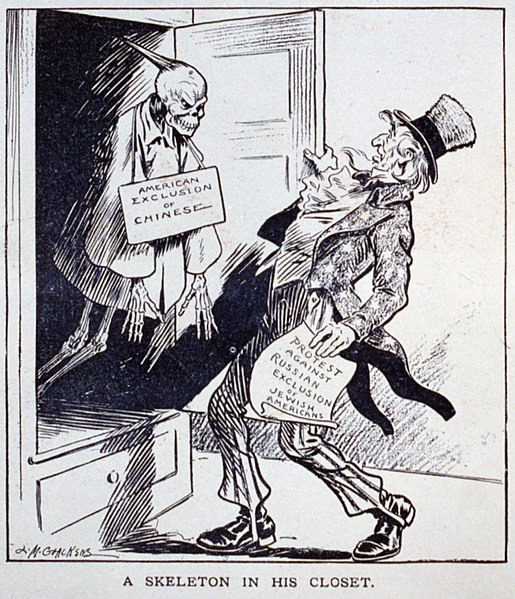
You were informed a few weeks ago about what was billed to be a major Immigration Study released by the Brookings Institute and Duke University. I believe that the actual study has been posted to BB.
Well, as is often the case, such studies do not live up to their billings. The following is the critique of the study in question by the Immigration Policy Center , IPC. Read both the original and its critique and then decide which side has done a better job.
******************************************************************************************
The report that emerged from this process focuses on six principles:
•Reduce Illegal Immigration by Linking Workplace Verification and Legalization. The Roundtable proposed a legalization program for unauthorized immigrants who had been in the U.S. 5 years or longer, and a mandatory employment verification system with a secure ID. By linking the issues of workplace enforcement and legalization, the Roundtable believed that both those who want legalization and those that want additional enforcement would be incentivized to cooperate with one another.
•Reorient Immigrant Admissions Criteria. The Roundtable focused on maintaining the current level of legal immigration; however the balance of future immigration must be shifted away from family-based immigration and toward high-skilled employment-based immigration. They propose to limit family immigration to the “nuclear family” which does not include adult children or siblings. They also recommend the diversity visa program be eliminated.
•Rationalize Temporary Worker Programs. The Roundtable recommends replacing temporary visas with non-renewable, 5-year provisional visas that do not tie workers to a single employer. Provisional visa holders would have the option to obtain permanent status after 5 years.
•Establish an Independent Standing Commission on Immigration. The report recommends creation of a commission “to provide the deliberative forum that immigration policy has lacked.” It would allow for immigration to be dealt with on a regular basis and to escape the adversarial culture that has emerged.
•Promote the Assimilation and Integration of New Americans. The authors recommend the creation of a new Office of New Americans to oversee and coordinate efforts to integrate and assimilate immigrants into American society.
•Engage Mexico. The Roundtable called for enhanced cooperation with Mexico on issues ranging from law enforcement to immigration.
Despite their valiant efforts, the Brookings/Kenan report falls short in its analysis of the current immigration dilemma. In several ways, the impact of the report’s recommendations would be inconsistent with the very principles the authors put forward. For example:
Maintaining current levels and being flexible: The Roundtable acknowledges that “America needs an immigration policy that responds to the labor requirements of employers…” Yet while calling for a more flexible system, the authors also insist on maintaining current levels of legal permanent immigration without any explanation of why the current number is the correct number.
Legalization and ending undocumented immigration: An arbitrary 5 year cut off date for the legalization program guarantees that a large number of immigrants—30%—would not qualify and would therefore remain unauthorized or try to legalize despite not having proper evidence of residency, thus failing to resolve the problem. A legalization program that invites fraud and leaves a large undocumented population is hardly a recipe for success.
Integration and the family: The authors dedicate an entire section of their report to integration and assimilation, yet their recommendations to severely cut family immigration fly in the face of successful integration. Researchers have shown that immigrant families provide vital emotional, psychological, and cultural resources that shelter and sustain family members and aid in their integration into U.S. society. Shifting the balance from family to employment-based immigration would remove one of the most important ways we have of integrating immigrants.
False dichotomy between family- and employment-based immigration: By trading family-based visas for highly-skilled employment-based visas, the authors fail to acknowledge that immigrants who come on family visas are workers and contribute to the economy. Research shows that the incomes of family-based immigrants tend to grow more rapidly than the incomes of employment-based immigrants. In fact, the incomes of the two groups tend to equalize over time. Because of their unique backgrounds and abilities, family-based immigrants are more likely to adapt to the evolving demands of the labor market and less likely than employment-based immigrants to compete with the native-born for jobs. Family-based immigrants are also entrepreneurial; broad family linkages are critical because they provide immigrants with the “social capital” to pool financial resources and to start and manage a wide range of small- and medium-sized businesses that would otherwise not be economically viable.
Future immigration and enforcement: The authors clearly want to reform the immigration system in a way that ends undocumented immigration as we know it. However, the way they envision future immigration would appear to invite future unauthorized immigration, thus failing to resolve our current dilemma and making future enforcement even more difficult. By eliminating, or failing to include, legal channels for close family members and lower-skilled workers, the incentive for these individuals to immigration illegally increases, thus repeating the problems of IRCA.
According to Galston, Pickus and Skerry, “During our deliberations, we came to recognize that we would never resolve our principled disagreements. Nonetheless, progress at the policy level turned out to be possible, and the results fruitful.” If the Brookings/Kenan report proves one thing, it is that immigration policy is extremely complex, and even the best intentions could have harmful unintended consequences














